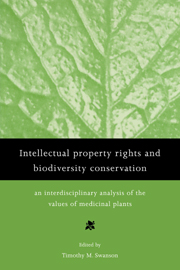 Intellectual Property Rights and Biodiversity Conservation
Intellectual Property Rights and Biodiversity Conservation Book contents
- Frontmatter
- Contents
- List of contributors
- Preface
- Acknowledgements
- 1 Diversity and sustainability: evolution, information and institutions
- Part A Plant communities and the generation of information
- Part B The value of plant-generated information in Pharmaceuticals
- Part C The institutions for regulating information from diversity
- 7 The appropriation of evolution's values: an institutional analysis of intellectual property regimes and biodiversity conservation
- 8 Preserving biodiversity: the role of property rights
- Part D The importance of cultural diversity in biodiversity conservation
- Index
7 - The appropriation of evolution's values: an institutional analysis of intellectual property regimes and biodiversity conservation
Published online by Cambridge University Press: 21 January 2010
- Frontmatter
- Contents
- List of contributors
- Preface
- Acknowledgements
- 1 Diversity and sustainability: evolution, information and institutions
- Part A Plant communities and the generation of information
- Part B The value of plant-generated information in Pharmaceuticals
- Part C The institutions for regulating information from diversity
- 7 The appropriation of evolution's values: an institutional analysis of intellectual property regimes and biodiversity conservation
- 8 Preserving biodiversity: the role of property rights
- Part D The importance of cultural diversity in biodiversity conservation
- Index
Summary
Introduction
Evolution generated the existing range of biological diversity in a process extending over four and a half billion years, with the vast majority of the forms of life arising in the past half billion years. These life forms have now evolved and coevolved for a period of five hundred million years producing a range of chemical and biological actions and interactions as a result. The existing set of species contain a static portrait of this lengthy process and these long-standing relations. They, and all of the inter-relations between them, are the product of the evolutionary process.
Over the last ten thousand years human societies have launched a concerted assault on both evolution and its product. We have usurped the evolutionary role, as we now allocate the resources required for survival between competing life forms, and we are performing this role in a manner that is rapidly depleting the evolutionary product. Obviously, the period during which evolution has been under assault matches closely the period of human societal development and the ‘birth of civilisation’. There have been human benefits derived from this usurpation of the evolutionary role; however, this volume concerns the costs of this operation. With humans undertaking this function, we have lost the benefits of having nature perform the same task.
Information
- Type
- Chapter
- Information
- Intellectual Property Rights and Biodiversity ConservationAn Interdisciplinary Analysis of the Values of Medicinal Plants, pp. 141 - 175Publisher: Cambridge University PressPrint publication year: 1995
Accessibility standard: Unknown
Why this information is here
This section outlines the accessibility features of this content - including support for screen readers, full keyboard navigation and high-contrast display options. This may not be relevant for you.Accessibility Information
- 6
- Cited by